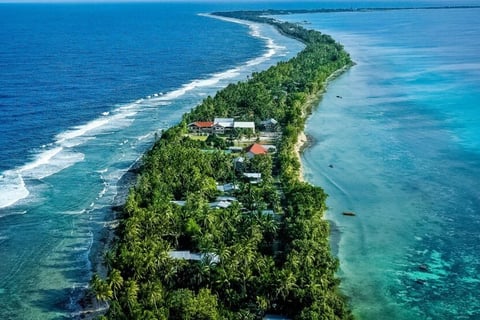
The Environmental Challenges Facing Tuvalu and How the World Can Help
Tuvalu, one of the smallest island nations in the world, faces severe environmental challenges due to climate change. Located in the Pacific Ocean, this nation is particularly vulnerable to rising sea levels, coastal erosion, and other environmental issues that threaten its very existence. As these challenges worsen, Tuvalu has taken significant steps towards sustainability and adaptation, but global cooperation is necessary to mitigate the ongoing risks.
PAPERS
5/8/20243 min read
Introduction
Tuvalu, one of the smallest island nations in the world, faces severe environmental challenges due to climate change. Located in the Pacific Ocean, this nation is particularly vulnerable to rising sea levels, coastal erosion, and other environmental issues that threaten its very existence. As these challenges worsen, Tuvalu has taken significant steps towards sustainability and adaptation, but global cooperation is necessary to mitigate the ongoing risks. Check out project's on Tuvalu's Climate Control official website here.
Environmental Impacts on Tuvalu
The most pressing threat to Tuvalu is rising sea levels, which have already increased by nearly 6 inches in the past three decades. This rise is accelerating, with predictions of an additional 20 cm by 2050 and up to 1 meter by 2100. These changes, caused by global warming and melting ice caps, are occurring at a rate 1.5 times faster than the global average. Tuvalu’s islands, particularly Nanumanga and Nanumea, are seeing episodic flooding as a result of natural ocean fluctuations combined with rising seas, increasing the severity of storms and tidal waves (NASA, 2023).
The environmental degradation doesn't stop there. Sand extraction for building materials has exacerbated coastal erosion, further endangering the islands' fragile ecosystems. Coral reefs, essential to marine life and coastal protection, are suffering from warming ocean temperatures and acidification. Saltwater intrusion is contaminating groundwater supplies, making farming increasingly difficult and threatening food security (CIA World Factbook).
Tuvalu’s Sustainability Efforts
Tuvalu is working hard to adapt to these unprecedented challenges. One of its primary initiatives is the Tuvalu Coastal Adaptation Project (TCAP), which focuses on building resilience against sea-level rise. Scientific data from organizations like NASA’s Sea Level Change Team informs these efforts, providing critical monitoring and early warning systems. The collaboration between Tuvalu and international scientific bodies ensures that the nation is armed with the best tools to plan for future impacts (NASA, 2023).
Tuvalu also plays a leading role in the Rising Nations Initiative (RNI), an international movement that seeks to preserve the statehood and sovereignty of atoll nations threatened by climate change. In a landmark decision, Tuvalu amended its constitution in 2023 to enshrine its statehood, ensuring that it remains recognized as a nation even if the islands become uninhabitable due to rising seas (Library of Congress, 2023).
On the legal front, Tuvalu has also taken bold steps. In September 2023, Tuvalu's Prime Minister addressed the International Tribunal for the Law of the Sea, arguing for recognition of carbon emissions as marine pollution. The country is actively advocating for legal frameworks that protect vulnerable nations from the worst impacts of climate change, pushing for international obligations to safeguard the marine environment (Library of Congress, 2023).
How the World Can Help
While Tuvalu’s efforts are commendable, they alone are not enough to prevent the worst outcomes of climate change. Here are several ways the global community can assist:
Support Global Climate Agreements: Nations must honor and strengthen commitments under the Paris Agreement, targeting reductions in global greenhouse gas emissions. This is crucial for preventing catastrophic sea level rise that threatens island nations like Tuvalu.
Provide Financial Assistance: Wealthier nations, responsible for the majority of emissions, should increase financial support for climate adaptation projects. Initiatives such as the Green Climate Fund can direct resources to countries like Tuvalu, helping them build the infrastructure needed to withstand environmental threats.
Promote International Legal Protections: The world needs stronger international laws that protect nations affected by climate change. Tuvalu’s efforts to gain recognition for statehood and sovereignty in perpetuity despite potential land loss could serve as a model for other vulnerable nations.
Invest in Renewable Energy: Tuvalu and other at-risk nations should be supported in transitioning to renewable energy sources. This would not only reduce emissions but also provide them with energy security, reducing dependence on imported fossil fuels.
Foster Scientific Collaboration: Ongoing scientific partnerships, such as those between Tuvalu and NASA, should be expanded. Monitoring tools like the SWOT satellite can offer real-time data on sea levels and help vulnerable nations adapt more effectively (NASA, 2023).
Conclusion
Tuvalu’s environmental challenges are a stark reminder of the global impact of climate change. While the nation has taken significant steps to adapt, its survival depends on greater global cooperation. From adhering to international climate agreements to supporting legal protections for vulnerable nations, the world has a role to play in ensuring that Tuvalu and other island nations have a future. Check out project's on Tuvalu's Climate Control official website here.



